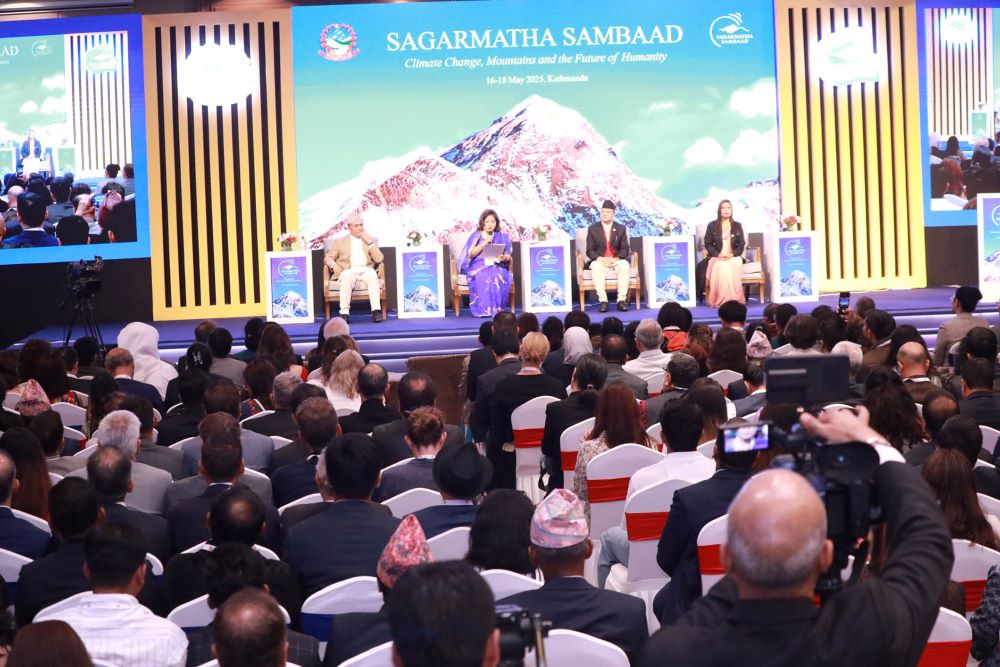
Kathmandu, May 18: Sagarmatha Sambaad, a global dialogue forum in Nepal themed ‘Climate Change, Mountain and the Future of Humanity’ concluded successfully in Kathmandu by further internationalizing mountain agenda.
The three day mountain dialogue issued a 25-point declaration- ‘Sagarmatha Call for Action’.
“Recognizing that climate change is an unprecedented challenge and that the well-being of present and future generations of humankind depends on immediate and urgent response,” stated the Sagarmatha Call, reaffirming commitments to implement the United Nations Framework Convention on Climate Change (UNFCCC), the Paris Agreement and the 2030 Agenda for Sustainable Development.
The clarion call furthered stated to encourage collective efforts to ensure equitable and simplified access for the developing countries, particularly those vulnerable to climate change, to the international climate finance from bilateral, multilateral and alternative sources, including the operating entities of the Financial Mechanisms and the Funds under the UNFCCC and the Paris Agreement.
The government has believed that the event was successful to further globalize the mountain agenda and reiterated Nepal’s commitment to globally burning issue- climate change.
In the inauguration, PM Oli had shed light on the severe impacts of climate change in the country and the globe, and underlined the importance of ‘power of dialogue’ in addressing challenges.
Foreign Minister Dr Arzu Rana Deuba observed that the dialogue was effective to bring to fore the issues facing the mountainous to island countries in the wake of climate change. The Sambaad was instrumental in bringing together voices of policy makers, leaders, experts, educationist, civil society, international organization and communities.
The issues and suggestions furnished in the event would be raised in the international forums, including the high level international conference on glaciers’ preservation being held at the end of this month in Tajikistan, review of SDGs at a high level political forum to be held in July, and 80th General Assembly of UN in September, and the COP-30 to be held in Brazil.
The government has announced to hold the next edition of the Sambaad in 2027.
Minister for Forest and Environment Ain Bahadur Shahi Thakuri claimed the dialogue was successful to make the world known about climate change impacts on mountain ecosystem. It was also instrumental in paving way to claim the finance from the loss and damage fund in addition to further globalizing mountain agenda.
The Sambaad is considered to have been a success to push for collective efforts to address the issues of climate change impacts in Nepal and other such countries that are struggling to tackle climate crises despite their very negligible contributions to carbon emissions.
Foreign Secretary Amrit Bahadur Rai said the event turned highly significant to sensitize the issues of Himalayas that meaningful discussions were held for regional and global partnership on climate issues.
The representatives of different countries and organizations expressed their solidarity and unity for climate crises resolution.
A total of 175 foreigners from more than three dozen countries and equal number of Nepali officials and experts participated the first edition of the Sagarmatha Sambaad. During the 3-day-long event, 12 parallel sessions were held.
Likewise, a ministerial-level meeting of the Hindu Kush Himalaya (HKH) region was also held on the sideline of the Sambaad, which ended with the conclusion of further cooperation to preserve the ecosystem of HKH region.
Foreign Affairs Ministry’s Joint Secretary and the Coordinator of Publicity Committee Lok Bahadur Paudel Chhetri viewed that the Sambaad was a good platform to highlight Nepal’s commitment on global issues of climate change and solicit global cooperation and forge partnership.
The government has decided to convene the Sagarmatha Sambaad in every two year. Similarly, Member Secretary of Sambaad Secretariat and Joint Secretary of Ministry of Forest Dr Maheshwor Dhakal said the Sambaad stated that Nepal shared its best practices on conservation to the world community. Nepal had opportunities to learn from the world’s best practices on climate crises mitigation, he added.(RSS)
Comments